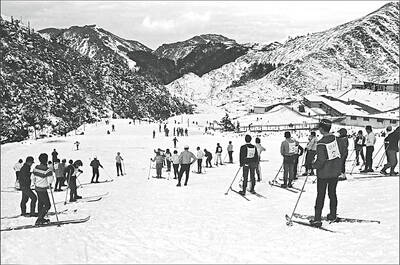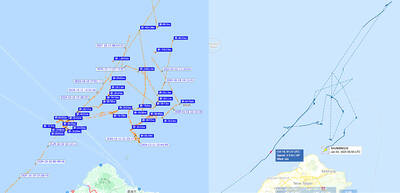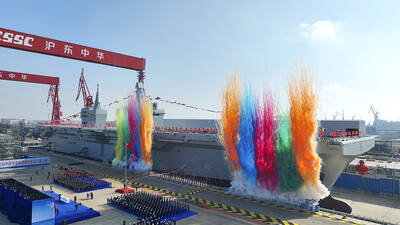US President Barack Obama barely mentioned foreign policy in his 65-minute State of the Union address on Tuesday and dealt with the Asian-Pacific region in less than a sentence.
He said the US should “continue to focus” on the Asia-Pacific, but offered no new policies or plans, or even a comment on the state of play of his much-heralded “rebalancing” to the region.
The annual speech, delivered before both houses of the US Congress, is generally considered to be one of the best opportunities for the White House to explain its priorities for the year ahead to the US public.
In a briefing of the foreign press given a few hours before the speech, American University history professor Allan Lichtman said that foreign policy would definitely take a backseat to domestic policy at a time of economic and employment problems at home.
“Truth is, Americans don’t give a darn about foreign policy,” he said.
He correctly predicted that the “pivot to Asia” would not be mentioned.
“I think the pivot to Asia is real — Obama knows how important relations with China and Japan, and other parts of Asia are,” Lichtman said.
The president was unlikely to discuss Asia, he said, “but you shouldn’t read anything into that.”
Obama did briefly talk about problems with Iran and its nuclear program, and he spent a minute or two on Syria, Israel and Afghanistan. However, he put forward no new foreign policy ideas.
The Brookings Institution released a memo it sent to the president last week (when the speech was being prepared) in which academics, including former American Institute in Taiwan chairman Richard Bush, recommended that the White House announce the launch of a concerted diplomatic effort to mitigate the risks of conflict between Asian powers in the South China Sea and East China Sea. It also recommended that Obama “personally engage” Chinese President Xi Jinping (習近平) to emphasize there would be “serious consequences” if China pursued its interests through military means.
A group of foreign policy experts who have formed an organization called “Foreign Policy Initiative” released a list of five issues they hoped Obama would address in his State of the Union speech.
They said it was “essential” that Obama make clear to China that the US would stand firm with its Asian allies and partners “in the face of Beijing’s bullying.”
A Wall Street Journal — NBC News poll issued just before the speech showed that the nation was “increasingly worried” about Obama’s abilities, dissatisfied with the economy and fearful for the country’s future.
“Since the rise of modern polling in the 1930s, only George W. Bush has begun his sixth year in the White House on rockier ground than Mr Obama,” the Wall Street Journal said.

A strong continental cold air mass and abundant moisture bringing snow to mountains 3,000m and higher over the past few days are a reminder that more than 60 years ago Taiwan had an outdoor ski resort that gradually disappeared in part due to climate change. On Oct. 24, 2021, the National Development Council posted a series of photographs on Facebook recounting the days when Taiwan had a ski resort on Hehuanshan (合歡山) in Nantou County. More than 60 years ago, when developing a branch of the Central Cross-Island Highway, the government discovered that Hehuanshan, with an elevation of more than 3,100m,

Taiwan’s population last year shrank further and births continued to decline to a yearly low, the Ministry of the Interior announced today. The ministry published the 2024 population demographics statistics, highlighting record lows in births and bringing attention to Taiwan’s aging population. The nation’s population last year stood at 23,400,220, a decrease of 20,222 individuals compared to 2023. Last year, there were 134,856 births, representing a crude birth rate of 5.76 per 1,000 people, a slight decline from 2023’s 135,571 births and 5.81 crude birth rate. This decrease of 715 births resulted in a new record low per the ministry’s data. Since 2016, which saw

SECURITY: To protect the nation’s Internet cables, the navy should use buoys marking waters within 50m of them as a restricted zone, a former navy squadron commander said A Chinese cargo ship repeatedly intruded into Taiwan’s contiguous and sovereign waters for three months before allegedly damaging an undersea Internet cable off Kaohsiung, a Liberty Times (sister paper of the Taipei Times) investigation revealed. Using publicly available information, the Liberty Times was able to reconstruct the Shunxing-39’s movements near Taiwan since Double Ten National Day last year. Taiwanese officials did not respond to the freighter’s intrusions until Friday last week, when the ship, registered in Cameroon and Tanzania, turned off its automatic identification system shortly before damage was inflicted to a key cable linking Taiwan to the rest of

China’s newest Type-076 amphibious assault ship has two strengths and weaknesses, wrote a Taiwanese defense expert, adding that further observations of its capabilities are warranted. Jiang Hsin-biao (江炘杓), an assistant researcher at the National Defense and Security Research, made the comments in a report recently published by the institute about the Chinese Communist Party’s (CCP) military and political development. China christened its new assault ship Sichuan in a ceremony on Dec. 27 last year at Shanghai’s Hudong Shipyard, China’s Xinhua news agency reported. “The vessel, described as the world’s largest amphibious assault ship by the [US think tank] Center for Strategic and International